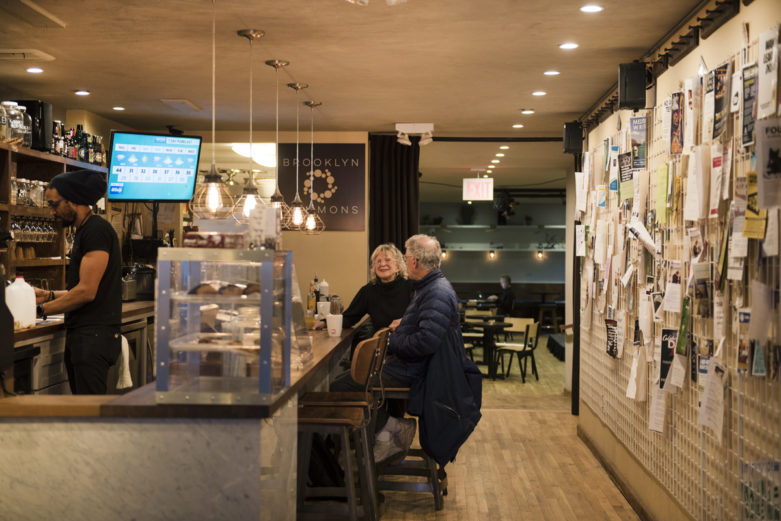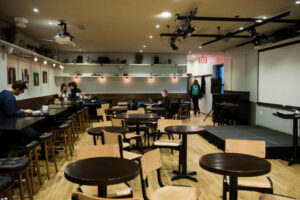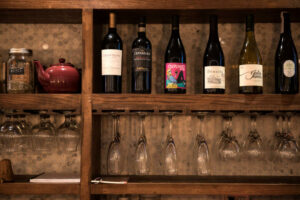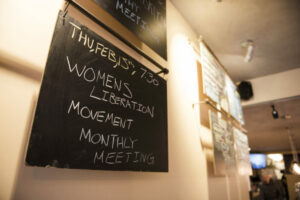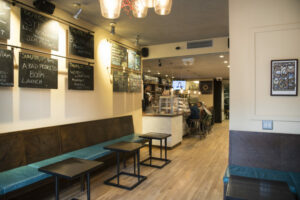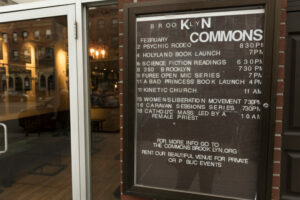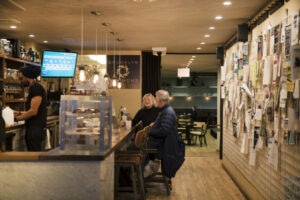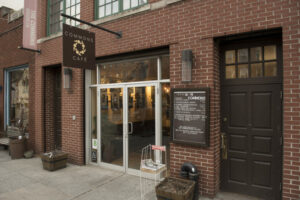
Between Bond and Hoyt on bustling Atlantic Avenue, just down the way from the Barclays Center, lies an unlikely community space, understated and altogether different from what one has come to expect in the new, often glossy Brooklyn. It’s a throwback to another era. When you enter the Brooklyn Commons, those seated at the Commons Café barely look up, engrossed as they are in conversation or reading. More than a place to see and be seen, it’s both a low-key and lively center where ideas are exchanged among the earnest, activist-leaning clientele.
You enter thorough a café and beyond that there’s a large room with additional seating where cafégoers can enjoy meals, conversation, work or study between events. Behind the café bar, alongside a curated craft beer and wine selection, are rows of loose herbal teas, including blends, many of which are grown in Brooklyn Commons proprietor Melissa Ennen’s home garden. Chalkboard menus show the day’s offerings of grilled sandwiches, salads and more. A pastry case sits beside the cash register. It’s got what you’d expect.
But what sets this café apart is its business model. Workers are not just employees but employers as well. Seldom seen around these parts, it’s a cooperative business model, where workers own shares in the business. The workers’ success is the business’s success, which in turn comes back to the workers. Since the café’s opening in 2015, this cooperative model has been continually refined, and currently the Commons Café is seeking workers to join the co-op. Ennen sees it as the business model of the future, a more democratic workspace lying beyond the traditional hierarchical mode. We got the chance to catch up with Ennen to learn more about the position and how those interested can reach out.
Edible Brooklyn: The position you seek to fill is for a café worker in a cooperative business model. Can you describe?
Melissa Ennen: A worker co-op is a business owned and managed by its workers. Some day our societies will move beyond capitalism to a more democratically run economy. Co-ops are a step toward that future, and they offer dignified and sustainable work in the present.
EB: What type of responsibilities are we talking about?
ME: The café offers espresso drinks and teas, beer and wine, sandwiches, salads and soups. For now, all staff members learn how to do everything. But as worker-owners, people will also be expected to take on managerial and administrative duties and make decisions about the operations and growth of the business.
EB: Would this be part-time, full-time, or up to the individual?
ME: Worker-owners can be either full-time or part-time.
EB: Compensation? Benefits?
ME: Staff members start at $13/hour plus tips and after one month it goes to $15/hour plus tips. A New York City Food Protection Certificate is required and must be obtained no later than 30 days from date of hire. Future compensation and benefits will be decided by the worker-owners themselves.
EB: Are you exclusively accepting applications from those willing to be co-op members? What type of commitment are you looking for? If this isn’t right for the person, how difficult would it be to drop out?
ME: Although there is no commitment required to be hired, we really only want to interview people who think that they may want to become a worker-owner. We don’t expect anyone to make a decision overnight. There is an educational period, during which both sides decide whether it is a suitable fit. Currently that period is six months to a year.
EB: Located on Atlantic Avenue in Cobble Hill, the Brooklyn Commons is a four-story building with a roof garden up top and a café and event space on the ground floor. Beyond that, can you briefly describe the Brooklyn Commons, how it came to be and where it’s hoping to go?
ME: We want to become a hub of workplace democracy in Brooklyn. We hope that most of our vendors will be cooperatives, and we want to spread the word about all the experiments in economic democracy happening around the country and the world. We also hope to become active players in the growth of the new local food system for our bioregion.
EB: Anything else you’d like to add?
ME: Adjacent to the café is an event space that seats 75 where we host talks, films, music and comedy, open mics, workshops and parties. Once the co-op is smoothly running the café, it will be offered the opportunity to take over the event space, an exciting challenge for the worker-owners.
EB: How should applicants apply for this position and what’s the most important thing you’d like to hear from them?
ME: Applicants should write a letter describing their strengths and weaknesses in food service work, the special skills they could contribute, any experience with democratic decision-making, and their motivation for applying to be part of a worker-cooperative, and send it with a résumé to melissa@thecommonsbrooklyn.org.


